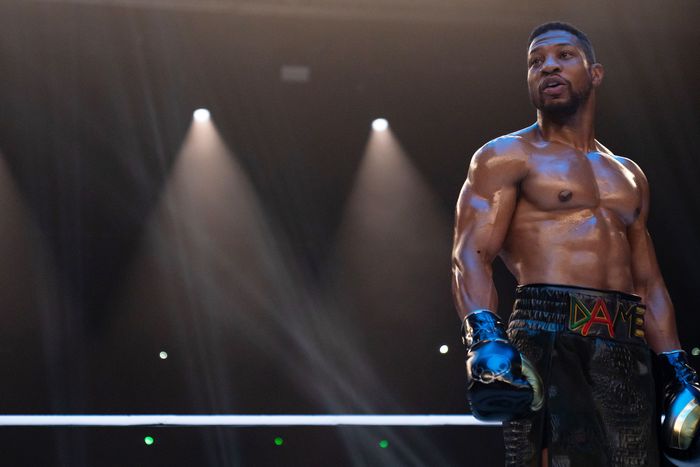
In Creed III, Jonathan Majors has the body of a god and the face of a man who’s just barely holding back tears. It’s a juxtaposition that the movie, directed by its star, Michael B. Jordan, takes its time setting up. Majors’s character, Damian “Diamond Dame” Anderson, first arrives onscreen tucked protectively inside a hoodie. He’s fresh off an 18-year prison stint and looks tender and raw and like someone who needs a few cushioned layers between himself and the outside world. Adonis Creed (Jordan) — Donnie to his wife, Bianca (Tessa Thompson), and to pretty much everyone else who doesn’t just call him “Champ” — assumes that his childhood friend has come to him for help. And yet when Dame works out alone in the grim by-the-week motel room he’s been living in, running through a ritual of curls and push-ups with single-minded determination, there’s nothing fragile about him. When he finally steps into the ring, he unveils muscles that look like they were chiseled out of granite. He’s no supplicant. He’s Donnie, if Donnie hadn’t been scooped from the foster-care system as a boy and brought to Bel Air by his adoptive mother, Mary-Anne Creed (Phylicia Rashad).
It isn’t easy to play someone who’s essentially an incarnation of survivor guilt. But Majors — who got sucked up into the Marvel engine so quickly after his breakout in The Last Black Man in San Francisco that we’ve barely had a chance to get to know him as a performer — is shaping up gloriously to be another intense, immersive technique mumbler in the vein of Marlon Brando and Tom Hardy. He really does play Dame as though the guy were a tulpa manifested by Donnie’s tamped-down traumas and fears about his own legitimacy. In fights, he moves with a lurching unpredictability, as though he’d built his body himself instead of being born into it. And he always looks alone, even when he’s surrounded by hangers on. It’s a great, arrestingly weird performance that might have unbalanced a more subdued movie, but in his directorial debut, Jordan shows an unabashed appreciation for masculine melodrama. His film, which was written by Zach Baylin and Keenan Coogler (whose brother Ryan Coogler retains a story credit), gives a grandeur to the relationship between Donnie and Dame, who were like siblings as kids together in a group home, got separated by incarceration, and reunite as men uncertain whether they want to hug or fight one another.
The Rocky movies have always been about doing a bit of both, balancing sentimentality and brutality. This is a series that kicked off as the gritty story of a lovable schmuck trying not to lose too badly when he gets a shot at the champ, and then turned around in the sequel and let that schmuck not only win the rematch, but win by way of a narrowly averted double knockout. The Creeds are Rocky movies, even if Sylvester Stallone, who’s currently at war with producer Irwin Winkler over the rights to the franchise, refused to appear in this latest one. Ryan Coogler gave us one of the greatest blockbusters of the past decade with 2015’s Creed, one that gently rebuked aspects of Stallone’s mythmaking while building on it with evident affection. But Creed II, which Stallone co-wrote, couldn’t figure out a satisfying mix of the serious (Donnie and Bianca have a baby) and the ridiculous (Donnie fights the son of Dolph Lundgren’s character from Rocky IV). Jordan may not have Coogler’s filmmaking talent, but he has a feel for the high drama of his film’s central conflict, as well as anime influences that work surprisingly well in a property that is as much about fighting the world and oneself as it is about fighting an opponent.
In Jordan’s gutsiest stylistic swing, the background of a fight fades away, leaving the ring floating in the dark in silence as the two boxers circle one another. As they throw punches, one of the corners is replaced by an artifact from the abusive home Dame and Donnie once shared, and while they grapple, the ropes are replaced by the bars of a prison cell. The figurative becomes literal, but hey, there’s never been a need for subtlety here — Donnie is battling with the man he could have, and sometimes feels like he should have, been. Creed III’s greatest achievement is demonstrating that there’s more story to be told about Donnie, who after two films had been looking pretty thoroughly explored as a character. It’s doing what so many films have to in this age of IP and pulling timeline acrobatics to extract new drama from the spaces between old installments, but it does so with unusual care. Dame isn’t just a figure from Donnie’s past, but a reminder of the hardships and advantages Donnie’s come from, and of the prison pipeline he was almost shunted into. With his mansion in the hills, his nice suits, and his thriving post-retirement career as a promoter, Donnie’s hovering above the streets he once fled through. The drama isn’t about whether he’s going to win when he inevitably gets back in the ring (he pulls a plane across the tarmac in his training montage and everything). It’s about whether, when faced with a glimpse of who he could have been, he’s willing to believe he deserves what he has.
More Movie Reviews
- The Accountant 2 Can Not Be Taken Seriously
- Another Simple Favor Is So Fun, Until It Gets So Dumb
- Errol Morris Has Been Sucked Into the Gaping Maw of True Crime


